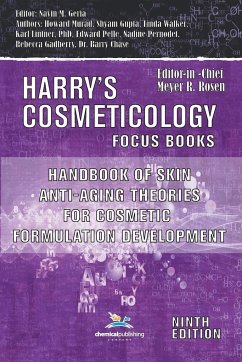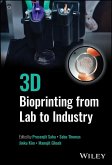The new 9th edition of Harry's Cosmeticology is available as a 3 volume set containing over 2600 pages of new information on the recent changes in the cosmetic and personal care industry. Chemical Publishing is now offering key parts of the title for those interested in a particular subject area covered in the book. Harry's Cosmeticology 9th Edition has developed a new line of "Focus Books" for this purpose. Focus books are a series of selected chapters that can be used as a reference guide for a particular subject area. This focus book covers: - Part 1.4 Understanding the Value of Molecular Cell Biology and Gene Analysis for the Next Generation of Cosmetic Products - Auhtor: Howard Epstein Ph.D. - Part 4.3.3 MicroRNAs in Skin Physiology - Authors: - Jean-Marie Botto (Ph.D.), Valre Busuttil (Ph.D.), Florian Labarrade (M.Sc.), Catherine Serre (M.Sc.), Laurine Bergeron (M.Sc.), Christophe Capallere (M.Sc.), Nouha Domloge (M.D.) - Ashland Specialties France, Global Skin Research Center, - Upstream Research, Sophia-Antipolis, France. - Part 5.6 Epigenetics of Skin Aging - Author - Rebecca James Gadberry - Senior Instructor & Program Coordinator, Cosmetic Sciences, UCLA Extension Consultant, Skin Care Strategy, Brand & Product Development - Part 1.4 Understanding the Value of Molecular Cell Biology and Gene Analysis for the Next Generation of Cosmetic Products - Author: Howard Epstein Ph.D., - EMD Chemicals, Philadelphia PA - Table of Contents - 1.4.1 Introduction - 1.4.2 Principles of Molecular Biology - 1.4.3 Proteomics, genomics and epigenetics - 1.4.4 Application for Skin Care - 1.4.5 (Future perspectives) Conclusion - References - Glossary - Part 4.3.3 MicroRNAs in Skin Physiology - Authors: Jean-Marie Botto (Ph.D.), Valre Busuttil (Ph.D.), Florian Labarrade (M.Sc.), Catherine Serre (M.Sc.), Laurine Bergeron (M.Sc.), Christophe Capallere (M.Sc.), Nouha Domloge (M.D.) - Ashland Specialties France, Global Skin Research Center, - Upstream Research, Sophia-Antipolis, France. - Table of Contents: - 4.3.3.1 RNA interference and microRNAs timeline of the discoveries - a. Discovery of microRNAs - b. The concept of RNA interference - 4.3.3.2 MicroRNAs : nomenclature, structure, function, mechanism of action - 4.3.3.3 How MicroRNAs regulate various aspects of human physiology and epigenetics - 4.3.3.4 MicroRNAs and skin physiology - a. Introduction on skin - b. MicroRNAs and cutaneous biology - c. Epidermal renewal and skin barrier - d. MiR-203 is a master regulator of epidermal differentiation - e. P63, SOCS3, Zfp281, JUN, and ABL1 are the major mir-203 targets in the epidermis - f. Other microRNAs important in epidermal renewal - g. Skin pigmentation - h. Dermal physiology - i. MicroRNAs and the hypodermal adipocytes - j. Hair follicle morphogenesis - 4.3.3.5 Interest of microRNAs in the evaluation in vitro of anti-aging dermo-cosmetic ingredients - a. Skin aging - b. MicroRNAs and cellular senescence - c. Tissue-engineering and microRNA studies - Conclusion - References - Glossary - Part 5.6 Epigenetics of Skin Aging - Author: Rebecca James Gadberry - Senior Instructor & Program Coordinator, Cosmetic Sciences, UCLA Extension Consultant, Skin Care Strategy, Brand & Product Development - Table of Contents: - 5.6.1 The Human Genome Project Gives Birth To The Epigenetic Revolution - 5.6.2 Epigenetics Defined - 5.6.3 Two Primary Epigenetic Mechanisms - 1. DNA methylation - 2. Chromatin remodeling and histone modification - 5.6.4 Epigenetic Links To Aging - 5.6.5 Epigenetics And Aging Skin - 5.6.6 Epigenetics Mechanisms In DNA Damage and Repair - 5.6.7 Cosmetic Ingredients As Epigenetic Modifiers - 5.6.8 Nutriepigenetics: How Diet Alters the Epigenome - 5.6.9 Epigenetics: The Unifying Theory Of Aging? - 5.6.10 What the Future Holds - References - Glossary - List of Figures -
Hinweis: Dieser Artikel kann nur an eine deutsche Lieferadresse ausgeliefert werden.
Hinweis: Dieser Artikel kann nur an eine deutsche Lieferadresse ausgeliefert werden.








